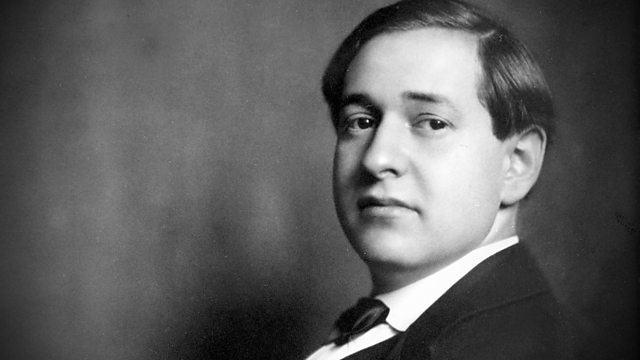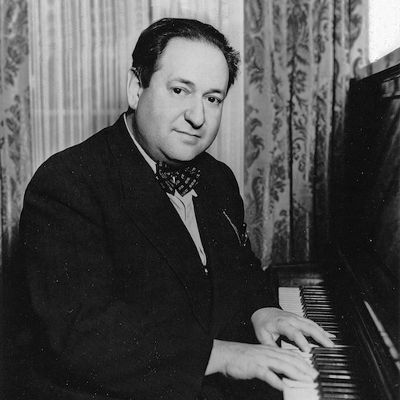
When I think of the classic Hollywood sound I think of Erich Wolfgang Korngold. The first internationally respected composer to write music for Hollywood, he was also one of the most influential, setting a template for symphonic scores which shaped the sound of American films for over a decade.
He was born on 29 May 1897 in Brünn (now Brno) in what was then the Austro-Hungarian Empire and lived in Vienna, where his father, Julius, was a noted music critic. A child prodigy, Korngold started composing original music at the age of seven and was pronounced a genius by Mahler at the age of 12. Rumours circulated that music attributed to him was actually written by his father. As composer David Raksin later recalled, Korngold senior replied: “If I could compose music of this quality, do you think I would be writing music criticism?” Korngold composed his first operas when he was 17; Die tote Stadt, likely his most famous, premiered when he was 23.
Korngold wrote lieder, chamber works and incidental music; he also adapted the work of other composers, recreating several of Johann Strauss II’s lost scores. The latter caught Max Reinhardt’s ear. In 1934, Reinhardt staged A Midsummer Night’s Dream at the Hollywood Bowl with a cast including an 18-year-old Olivia de Havilland as Hermia and an even younger Mickey Rooney as Puck. The production was a success and when Warner Bros. asked Reinhardt to shoot a version for the screen, he brought Korngold to Hollywood to adapt Mendelssohn’s incidental music. Warner Bros. liked what they heard. They quickly asked Korngold to write an original score for a new film, a swashbuckler based on a novel by Rafael Sabatini. Robert Donat had been offered the lead but he declined; the studio had cast a promising young Tasmanian instead. The film was Captain Blood, the actor was Errol Flynn and Warner Bros. raked in box-office receipts like so many pieces of eight.
Captain Blood scored Korngold his first Oscar nomination, but he didn’t actually win one until 1936’s Anthony Adverse. According to historian Jon Burlingame, Academy rules dictated the Oscar for Best Original Score be given to the head of the studio’s music department. This led to the embarrassing spectacle of an award for a world-famous composer being presented to Warner Bros. department head Leo Forbstein who, incidentally, wasn’t a composer himself. The rules were revised soon afterwards.
Korngold scored over a dozen films between 1935 and his retirement from films in 1947. Most composers worked to timing sheets, which outlined where the director wanted music played and described the scenes in detail, down to fractions of a second. Korngold was different. He would run a film in his private projection room (specially provided by Warner Bros.) a reel at a time and compose to the running film. He also had a remarkable sense of timing: during recording sessions, he dispensed with the click track and conducted to the film with minimal cues.
From 1947 onwards he composed primarily for the concert hall; he was working on his second symphony and sixth opera when died in 1957, at the age of 60.
One of the last great Romantics, Korngold’s sound was lush and radiant, awash with colour. The music courses through you. His reputation seems to wax and wane with alarming frequency. In 1972, RCA/Victor released an album featuring selections from his scores. The record became a best-seller, reviving interest in his work and launching a now beloved series of recordings by Charles Gerhardt and the National Philharmonic Orchestra. Yet a recent documentary survey of film music (which for reasons of propriety shall remain nameless), justly made room for Alfred Newman and Max Steiner, but omitted Korngold from the ranks of Old Masters.
No matter. I adore his music and always will. These are my favourites of his scores.
‘Suite’, The Adventures of Robin Hood (1938): The stuff of chivalry. Robin Hood is chiefly responsible for The Hollywood Sound—an album of Oscar-winning film music recorded by John Williams and the London Symphony Orchestra—silently migrating from my father’s CD collection to mine. Korngold’s music, which won him his second Oscar, is pure fairytale: a simple yet complex structure filled with interlocking melodies. From the strings, percussion and horns swaggering into the theme for Robin and his Merry Men, to the ravishing love scene between Robin and Marian, everything blazes with Technicolor.
At first Korngold was reluctant to score what he regarded as a 90% action picture. Then came the Anschluss. Suddenly he needed money to get his family out of Austria; he would later refer to Robin Hood as the film that saved his life.
‘Main Title – Reunion – Finale’, The Sea Hawk (1940): One of the finest scores ever written. Rousing horns give way to windswept strings and a trilling flute. Cymbals clash like canon; you can almost taste the sea salt. The Sea Hawk has become such shorthand for swashbucklers that Stephen Fry and Hugh Laurie used it as the soundtrack for one of their sketches, in which a disgruntled constituent challenges an MP to a duel. (The music was replaced, poorly, on the DVD release, but you can still find the original floating around the ether.)
‘Lottery March’, Anthony Adverse (1936): Based on a best-seller, Anthony Adverse is an awkward, lumbering costume epic that never seems comfortable in its own skin. At least Korngold’s score is lively. ‘Lottery March’ begins as a carefree melody Olivia de Havilland sings to Fredric March on a carriage ride, then reappears as a bombastic victory lap for a family who, as the name implies, have just won the lottery. Korngold would later reuse the melody to even greater effect in his violin concerto, where it turns up in the second movement, slowed down to an aching romance.
‘Ship in the Night’, Captain Blood (1935): Romance on the high seas. A plaintive horn call backed by strings builds sweetly into Arabella’s (Olivia de Havilland) love theme. Korngold was forced to write his first completely symphonic score—over an hour of music—in just three weeks. Warner Bros. didn’t give him any more time. Since he incorporated music from Liszt to fill in about 10% of the score, Korngold insisted his credit be simply for ‘musical arrangement’. He was still a write-in nominee for Best Original Score at the Oscars.
‘Tomorrow’, The Constant Nymph (1943): Eerie tolling bells, stately strings, then a crescendo of horns, timpani and gong. The opening bars of ‘Tomorrow’ sound like a procession through a church yard at night. The Constant Nymph, about composer Charles Boyer and the women who love him, dodges the hazards of other films about fictional composers by delivering a magnum opus that’s actually worth the wait.
‘Main Title – Mother and Son’, Between Two Worlds (1944): Bells again. The ‘Main Title’ glistens, a shimmering overture to a score both mystical and magisterial. Between Two Worlds is a remake of Outward Bound, updating the story to World War Two: leaving a Blitz-scarred London, a group of passengers find themselves on a ship headed to the hereafter. Korngold helps buoy a fascinating but uneven film.
‘Love Theme’, Juarez (1939): A radiant theme for a doomed couple. Warner Bros.’ well-meaning but plodding film about Maximilian I (Brian Aherne) and Benito Juárez (Paul Muni) is bogged down with speeches and council chambers, but it also inspired this affecting melody: a musical symbol of Maximilian and his wife Carlota’s (Bette Davis) mutual devotion.
‘Main Title’, Kings Row (1942): Cinematic déjà vu. From the trumpet flourishes to the insistent drums, Korngold’s majestic theme for Kings Row will be familiar to anyone who’s ever heard a certain theme for a galaxy far, far away. John Williams has cited Korngold as an influence, with his score for Star Wars being the most obvious example. It’s a fitting tribute: if any composer has carried on Korngold’s tradition of leitmotifs and grand symphonic scoring, it’s Williams.
‘Cello Concerto’, Deception (1946): Twelve minutes of fireworks. Deception is a moody, melodramatic tale of concert pianist Bette Davis, torn between her love for cellist Paul Henreid and composer-conductor Claude Rains, the domineering ex who refuses to go quietly. Korngold’s concerto, composed by Rains for Henreid, is suitably tempestuous, at times imposing, at others slyly insinuating. The highlight of one of the composer’s last scores, it displays his complete mastery of tone and mood and confirms that at his best, there was no one quite like Korngold.

Leave a Reply